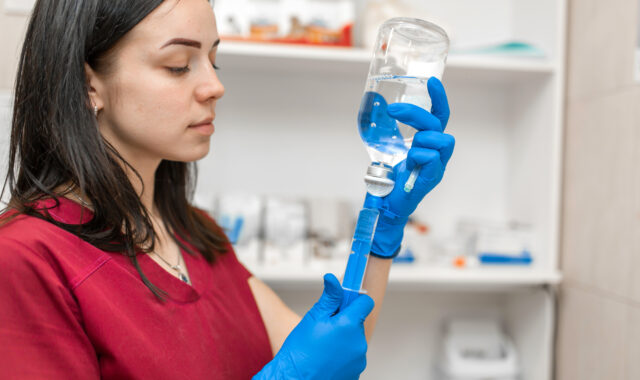This article provides an overview of available medicine degree apprenticeships, including where to find them and what they involve. While the large majority of these apprenticeships are with NHS employers, there are other opportunities available in private healthcare and charitable organisations. We will list these degree apprenticeships and explain where you can find them. For detailed information on applying to STEM degree apprenticeships and how they work, please refer to our separate article, What is a degree apprenticeship in STEM?
Medicine apprenticeships are evolving, offering pathways to become a professional through routes other than traditional university education. This approach allows for hands-on experience and specialised training, presenting a viable alternative for those looking to enter the medical field directly.
What medicine degree apprenticeships are there?
Below are some of the most common degree apprenticeships in the field of medicine. While this provides an overview, you should use your own research and the government ‘Find an apprenticeship’ service for England, Scotland, Wales and Northern Ireland to find the latest opportunities.
1. Nursing apprenticeship
Nursing apprenticeships focus on delivering compassionate care, medical assistance, and emotional support to patients while advocating for their health and well-being. Work is typically in 8, 10 or 12-hour shifts which may include unsociable hours, such as evenings, weekends and nights.
NHS trusts offer the Registered Nurse Degree Apprenticeship (RNDA), where you can specialise in one of the following areas:
These degree apprenticeships typically span four years, though shorter conversion courses are available for those who already hold a Level 5 qualification, such as a Nursing Associate apprenticeship. Upon completion, you will become a registered nurse.
2. Paramedic apprenticeship
Paramedic degree apprentices train in delivering crucial emergency medical care, stabilising patients and transporting them to healthcare facilities in urgent situations. This can take place in a front-line ambulance, GP surgery, minor injury centre, or other community settings.
The degree apprenticeship, which typically lasts three years, can be demanding, involving front-line work in often stressful situations, responding to 999 emergencies. This programme is newly available as of September 2023.

3. Physiotherapy apprenticeship
Physiotherapy apprenticeships focus on enhancing movement and function through both physical and psychological techniques, supporting people in their recovery from injury, surgery, or illness. Physiotherapists often work independently while also being part of a broader team of healthcare professionals involved in patient care.
These apprenticeships typically span four years and operate across various sectors, including public, private, and charitable organisations. The NHS is a major provider of physiotherapy apprenticeships, although private providers like Flex Health also offer opportunities, which can vary throughout the year.
3. Diagnostic radiography apprenticeship
Diagnostic radiography apprenticeships focus on using imaging techniques such as X-rays, CT scans, and MRI to diagnose and assess medical conditions within the body. While radiographers often work independently, they are also key members of a broader healthcare team. Ensuring safety for both patients and staff, you will work with patients and colleagues to help design optimal treatment programmes.
These apprenticeships typically last three years and are most commonly offered in hospital settings, primarily through the NHS. However, there may also be opportunities with private providers, which vary throughout the year.
4. Midwifery apprenticeship
Midwifery apprenticeships provide extensive training in supporting women throughout pregnancy, childbirth, and the postnatal period. Midwives play a crucial role in managing the care of both mother and baby, which includes preventative measures, identifying complications, and addressing emergencies. The apprenticeship typically involves shift work, including evenings, weekends, and nights, and lasts around four years.

While most apprenticeships are within the NHS, there may also be opportunities in the private sector, and some midwives may choose to work independently once qualified. The Nursing and Midwifery Council (NMC) oversees the apprenticeship to ensure safety and high standards, and midwives are responsible for staying current with the latest practices and knowledge.
5. Occupational therapy apprenticeship
Occupational therapy apprenticeships are designed to help individuals regain or develop the skills necessary for daily living and work, promoting their independence and enhancing their quality of life. These apprenticeships offer hands-on experience in a range of settings, including health, social care, education, and various voluntary or private sectors.
While occupational therapy apprenticeships are commonly found within the NHS, opportunities may also arise in other sectors throughout the year. Apprentices may work both individually under supervision or as part of a team, depending on the needs of their placement. The apprenticeship typically lasts for four years, providing a comprehensive blend of practical experience and academic learning to equip apprentices with the skills needed for a successful career in occupational therapy.
6. Medical doctor apprenticeship
The new medical doctor degree apprenticeship programme offers an alternative route to becoming a doctor, providing the same qualifications as those earned through a traditional full-time university medical degree. This apprenticeship pathway, which typically lasts five years, allows students to gain practical experience while working, unlike the traditional route where students do not earn a salary until after completing their degree. As with other degree apprenticeships, there are no tuition fees involved.
During the degree apprenticeship, students are required to attend medical school and undertake significant on-the-job learning. The programme is designed to meet all requirements set by the General Medical Council for entry onto the Medical Register, ensuring that apprentices achieve the same rigorous standards as their university-attending peers. The initiative aims to widen opportunities for aspiring doctors and address the current shortages in the UK medical workforce.

The programme is still in its early stages, with the first cohort set to begin in September 2024. While the apprenticeship is designed to uphold the high standards of medical training, there is ongoing debate about whether it will provide a comprehensive understanding of fundamental theory compared to traditional routes. We will gain a clearer picture of its effectiveness once the initial group of apprentices complete their training.
Other medicine-related apprenticeships
There are many other degree apprenticeships available in medicine-related fields, largely comprised of those offered by the NHS:
- Arts therapist: Uses creative methods such as art, music, or drama to help individuals express emotions and improve mental health and wellbeing
- Dietitian: Provides expert nutritional advice and develops tailored diet plans to help manage health conditions and promote overall wellness
- Operating department practitioner: Assists with surgical procedures, providing anaesthetic, surgical, and recovery care to ensure patient safety and comfort
- Podiatrist: Diagnoses and treats foot, ankle, and lower limb conditions, offering both preventative and therapeutic care
- Prosthetist and orthotist: Designs, fits, and maintains artificial limbs (prostheses) and supportive devices (orthoses) to improve patients’ mobility and quality of life
- Speech and language therapist: Assesses and treats communication and swallowing disorders to enhance individuals’ ability to communicate and eat effectively
- Therapeutic radiographer: Delivers radiotherapy treatments to cancer patients, working to target and destroy cancer cells while minimising harm to healthy tissue
- Psychological wellbeing practitioner: Provides support and evidence-based interventions for individuals experiencing mental health issues including anxiety disorders and depression, often focusing on cognitive-behavioural approaches
- Clinical associate in psychology: Supports psychologists in assessing and treating mental health conditions, using therapeutic techniques and contributing to clinical research and evaluation

How to find NHS degree apprenticeships
The NHS is the largest employer of medicine apprentices in the UK, making it a key source for those interested in medicine degree apprenticeships. To start your search for these opportunities, you may wish to use the following resources and methods:
- NHS Jobs website: A comprehensive portal listing various NHS job vacancies, including degree apprenticeships. Use the search function to look for fields you are interested in and set the contract type as “Apprenticeship”. You can filter results by various factors including location and NHS trust.
- GOV.UK ‘Find an Apprenticeship’ service: This site allows you to search for apprenticeships across different sectors, including healthcare. This includes current NHS apprenticeships as well as any offered by other employers.
- NHS trust websites: Each NHS trust may also advertise degree apprenticeship opportunities on its own website. Identify NHS trusts in your desired location and visit their careers or training sections. This can provide information on current vacancies, application procedures, and specific requirements.
- Contacting NHS trusts directly: If you’re interested in a particular NHS trust or region, consider reaching out directly. Contact their human resources or apprenticeship teams to inquire about upcoming opportunities or to express your interest.
There is a wide range of NHS and medicine-related degree apprenticeships available, offering diverse pathways into the medical profession. Whether you’re interested in working directly within the NHS or exploring private sector opportunities, these apprenticeships provide valuable practical experience and training.
The NHS, as one of the largest employers in the world, offers stability and a wealth of resources for professional development. It is well-regarded for supporting its staff through structured training and career progression opportunities, making it an attractive option for those pursuing a career in healthcare.
Let us know in the comments: what are your thoughts on degree apprenticeships as an alternative to traditional medicine-related university degrees? Please visit our dedicated article for more information on how degree apprenticeships compare to university education.



Comments